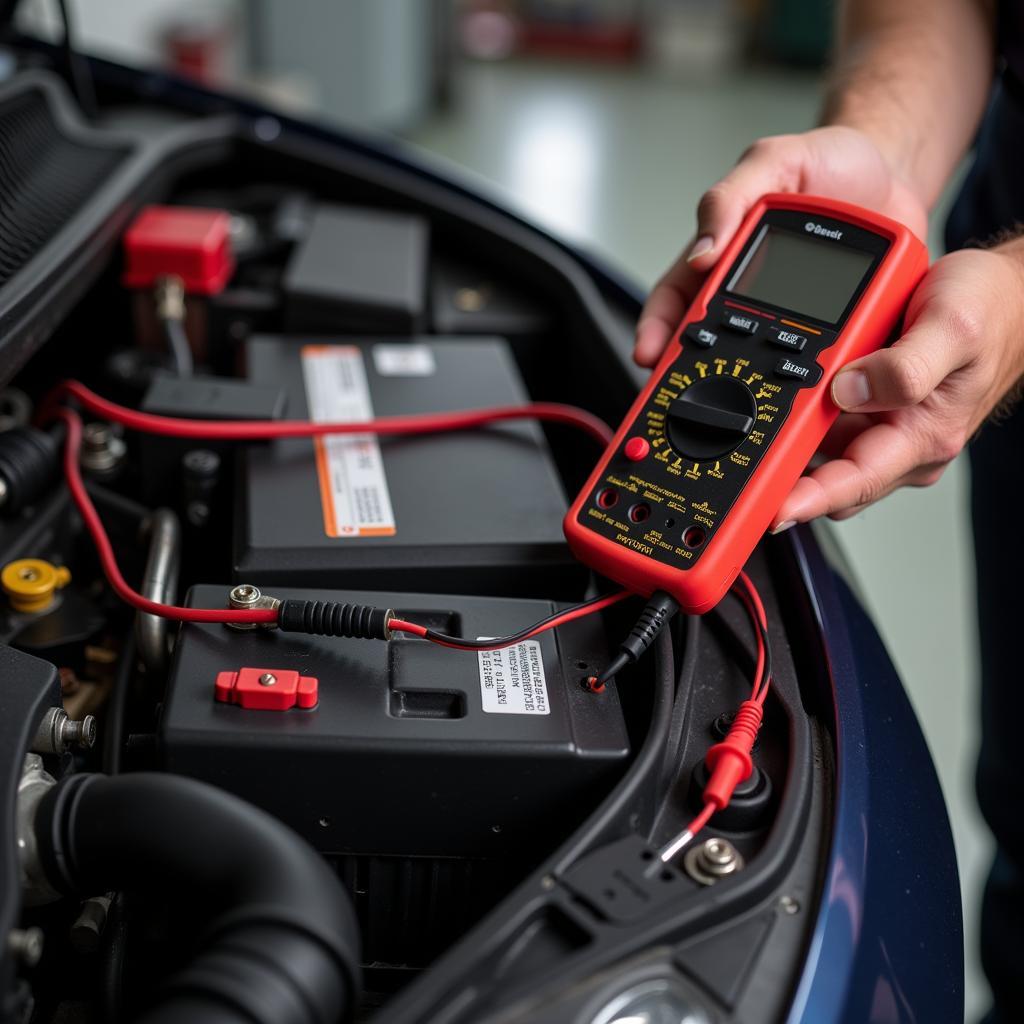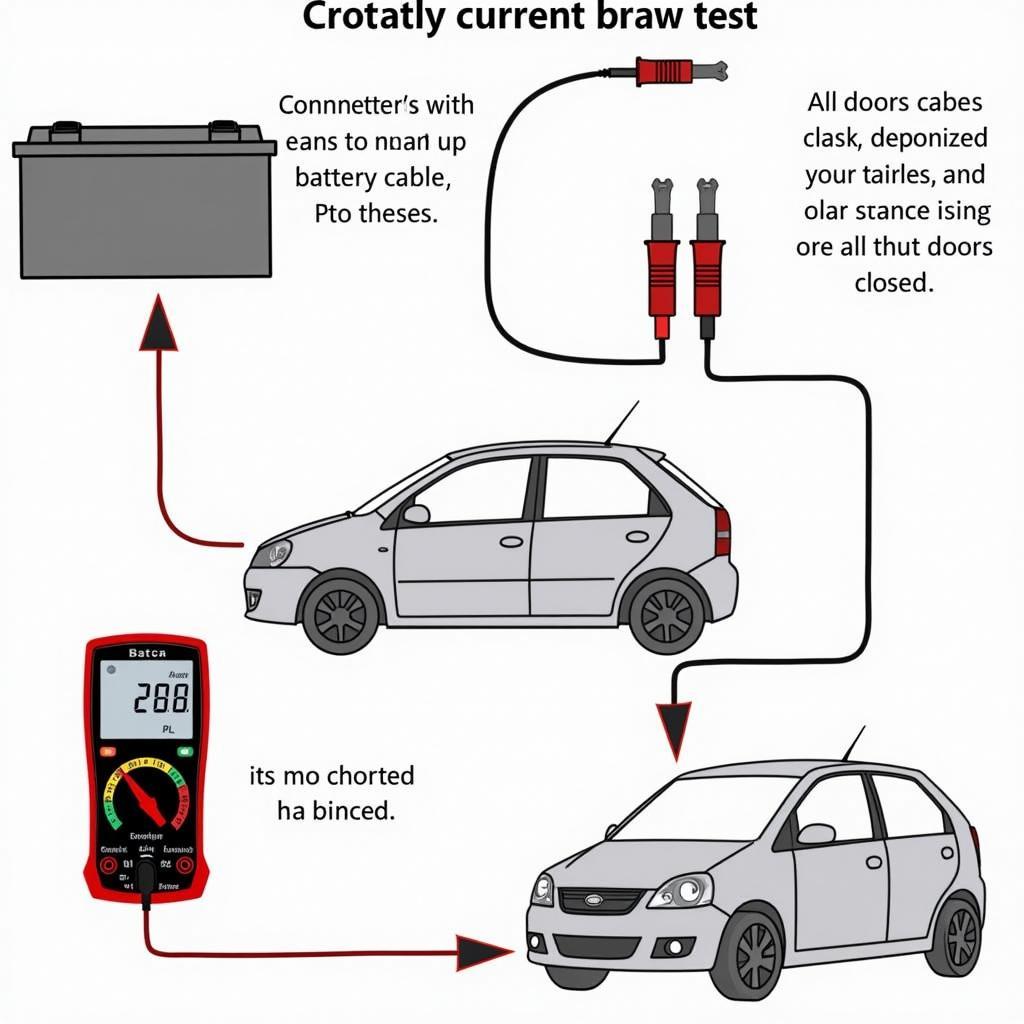That dreaded “car battery low warning” can be a real headache. In this comprehensive guide, we’ll delve into the various reasons behind this warning, from simple fixes to more complex issues, empowering you to troubleshoot and resolve the problem effectively. We’ll cover everything from understanding what causes a car battery low warning to how to prevent it in the future.
Decoding the Car Battery Low Warning
A car battery low warning usually manifests as a dashboard light, typically a red battery icon. It indicates that the battery voltage has dropped below a certain threshold, meaning it might not have enough power to start the car or operate essential electrical systems. Ignoring this warning can lead to being stranded, so it’s crucial to address it promptly.
A common cause is simply an aging battery. Over time, batteries lose their ability to hold a charge. Other culprits include leaving lights on, extreme temperatures, and faulty charging systems.
Common Causes of a Car Battery Low Warning
There’s a multitude of reasons why you might be seeing that car battery low warning. Here are a few of the most common:
- Old Battery: Like any other component, car batteries have a limited lifespan. Over time, their capacity to hold a charge diminishes.
- Parasitic Drain: This refers to a constant drain on the battery even when the car is off. parasitic drain causes can range from a faulty interior light to more complex electrical issues.
- Faulty Alternator: The alternator is responsible for charging the battery while the engine is running. If it’s not functioning correctly, the battery won’t receive the necessary charge, eventually triggering the warning.
- Extreme Temperatures: Both extreme heat and cold can negatively impact battery performance. Heat can accelerate the chemical reactions within the battery, shortening its lifespan. Cold can slow down these reactions, reducing its ability to provide power.
- Loose or Corroded Connections: A poor connection between the battery terminals and the car’s electrical system can prevent the battery from charging properly or delivering power effectively.
Troubleshooting the Low Battery Warning
Seeing the “car battery low warning”? Don’t panic! Here are some steps you can take:
- Check the Battery Terminals: Inspect the terminals for any signs of corrosion. If present, clean them with a wire brush and a baking soda solution.
- Jump Start the Car: If the car won’t start, try jump-starting it using another vehicle or a portable jump starter.
- Test the Alternator: Once the car is running, have the alternator tested to ensure it’s charging correctly. A simple multimeter test can determine if the alternator is outputting the correct voltage.
- Check for Parasitic Drain: If you suspect a parasitic drain, consult a mechanic who can use specialized equipment to identify the source. Diagnosing causes of parasitic drain on car battery requires expertise and specialized tools.
- Consider Battery Replacement: If the battery is old or failing, replacing it is the best solution.
“A car battery low warning is often the first sign of a larger issue,” says automotive electrical expert, David Miller. “Addressing the problem promptly can prevent further damage and avoid being stranded.”
Preventing a Car Battery Low Warning
Preventing a car battery low warning is often easier than dealing with the consequences. Here are some preventative measures:
- Regular Battery Testing: Have your battery tested every six months, especially during extreme weather conditions.
- Turn Off All Lights and Accessories: Make sure all lights, radio, and other accessories are turned off before exiting your vehicle.
- Keep the Battery Clean: Regularly clean the battery terminals to prevent corrosion.
- Park in a Garage When Possible: This helps protect the battery from extreme temperatures.
- Address Electrical Issues Promptly: Don’t ignore any electrical problems, as they could be contributing to a battery drain. Knowing the [possible causes of car battery drain](https://cardiagtech.shop/possible causes-of-car-battery-drain/) can help prevent future issues.
 Mechanic Testing a Car Battery
Mechanic Testing a Car Battery
“Prevention is key when it comes to car battery health,” advises Sarah Chen, an automotive engineer. “Regular maintenance can significantly extend the life of your battery and save you from unexpected headaches.”
Conclusion
A car battery low warning shouldn’t be ignored. Understanding the potential causes for car battery drain and taking proactive steps for prevention and troubleshooting can keep your car running smoothly and save you from the inconvenience of a drained battery car won t start situation. By following the advice outlined in this guide, you can address this common car issue effectively.
FAQ
-
How long does a car battery typically last? Most car batteries last between three and five years.
-
Can I drive with a car battery low warning? You might be able to drive for a short distance, but it’s not recommended. The battery might not have enough power to operate essential systems.
-
What should I do if my car won’t start after a jump start? The problem might be more serious than a low battery. Consult a mechanic.
-
How can I tell if my alternator is bad? A dimming of headlights or interior lights while driving can be a sign of a failing alternator.
-
Does car insurance cover battery replacement? Most car insurance policies don’t cover routine maintenance, including battery replacement.
-
Can I replace a car battery myself? Yes, but it’s important to take proper safety precautions.
-
What’s the difference between a deep-cycle battery and a regular car battery? Deep-cycle batteries are designed for sustained power discharge, while regular car batteries are designed for short bursts of high power to start the engine.


